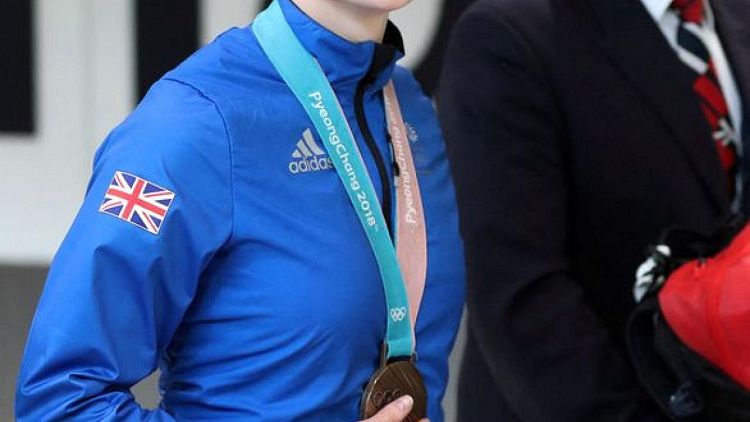By Martyn Herman
- For a country that does not even boast a skeleton track, Britain's record at producing Olympic medal winners in the high-speed sliding sport is phenomenal.
Since skeleton returned to the programme at Salt Lake City in 2002, British sliders have won three gold medals, three bronze and one silver.
British women have been especially dominant, having won the last three Olympic titles with Lizzy Yarnold topping the podium in 2018 and 2014 and Amy Williams in 2010.
Yarnold has since retired and Laura Deas, who took bronze four years ago in Pyeongchang, will be hoping to continue the country's medal streak in Beijing.
The 33-year-old Deas will be joined by Olympic debutantes Brogan Crowley, Matt Weston and Marcus Wyatt -- all of whom train at Bath University's concrete push track, a facility that enables sliders to perfect the all-important start.
Wyatt is a former American Football player, while Crowley was a promising heptathlete before being identified as having the attributes to slide down an icy track at speeds of 80mph.
Having the right people, the best in sports psychology and a marginal gains approach to equipment and training methods are all key to making Britain a skeleton powerhouse, says former horse rider Deas, who did not take up the sport until in her 20s.
"The biggest thing we do really well is bringing in the right athletes, finding the people to transfer from another sport into skeleton," Deas, the most experienced member of the squad, told reporters when the team was announced last week.
"We don't have a home track so we have to do lots of other things better than other nations."
In Pyeongchang a row erupted on the eve of the Games about the British team's state-of-the-art skinsuits and helmets -- with other nations claiming they gave them an unfair advantage.
Rivals may have wised up this time, although all will be revealed once the training runs start in Beijing.
"I've got a huge amount of confidence and excitement about what we are bringing out for the Games and what that will help us to achieve on the track," Deas said.
While Dominic Parsons took a bronze medal four years ago, Britain's men have not managed to emulate the success of the women. Wyatt, 30, says any colour medal in Beijing would be a success and believes that the team may have an advantage.
"Other nations have multiple home tracks and their athletes spend a lot of time on them," Wyatt, who won a test event on the track being used at the Beijing Games in October, said.
"But I think we've had 30 or 40 runs in Beijing and will have another 10 when we got there. As nation we are really good at learning these tracks quickly.
"There's no other track like it, it's really technical and difficult and I think the key will be consistency over the four runs. If you have three great runs but one bad one it will take you out of contention."
While the Olympics will be a new experience for Crowley, she said having role models like Williams and Yarnold fills her with confidence.
"As a woman, you don't always have incredible female idols within sport, but to have them skeleton has been amazing for me," she said
